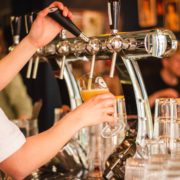Draught Lager Prices Experience Significant 11% Increase
Draught lager prices have seen a significant 11% increase since March 2023, according to recent data from the Office for National Statistics (ONS). This has led to concerns among pub-goers and publicans alike, as the cost of a pint of beer continues to rise. The price hike affects both lager and cask ale, with some brands seeing increases of up to 12% per keg.
The rise in prices is due to a number of factors, including increased production costs and a shortage of some key ingredients. The ongoing COVID-19 pandemic has also contributed to the rise, with many pubs and breweries struggling to stay afloat during lockdowns and restrictions. As a result, some have been forced to raise prices to cover their costs and keep their businesses running.
Despite the increase in prices, many pub-goers are still willing to pay for a pint of their favourite beer. However, others are turning to cheaper alternatives or opting to drink at home instead. Publicans are also feeling the pressure, with some struggling to make ends meet as a result of the price hike.
Reasons for the Increase
Brewing Costs
One of the main reasons for the increase in draught lager prices is the rising cost of brewing. The cost of ingredients such as hops and barley has increased due to a combination of factors including poor weather conditions and supply chain disruptions. In addition, energy costs have also risen, as breweries require a significant amount of energy to produce beer.
Transportation Costs
Another factor contributing to the increase in draught lager prices is the rising cost of transportation. As the cost of fuel increases, so does the cost of transporting beer from the brewery to the pub. In addition, there have been disruptions to the supply chain due to Brexit, which has led to increased costs and delays in transportation.
To offset these rising costs, breweries have had to increase their prices, which has resulted in higher prices for consumers. While this increase in price may be difficult for some consumers to swallow, it is important to remember that the cost of production and transportation is a significant factor in the price of draught lager.
Impact on Consumers
The recent 11% increase in draught lager prices by the Carlsberg Marston’s Brewing Company (CMBC) is likely to have a significant impact on consumers. This section explores the potential effects of the price hike on beer drinkers.
Price Comparison with Other Beers
The price comparison between CMBC’s draught lagers and other beers will be one of the key factors that will determine the impact on consumers. While the price hike is significant, it is important to note that CMBC’s lagers are still competitively priced compared to other brands. For example, a pint of Carlsberg Export will now cost around £4.60, which is still cheaper than many craft beers on the market.
However, the price hike may be more noticeable for regular beer drinkers who are used to paying lower prices for their favourite lagers. They may start to compare prices with other brands and switch to cheaper alternatives if they feel that the price increase is too high.
Potential Changes in Consumption Habits
Another potential impact of the price hike is that consumers may change their consumption habits. They may start to drink less beer or switch to other alcoholic drinks that are cheaper. This could have a knock-on effect on the overall sales of draught lagers, which could be a concern for CMBC and other beer manufacturers.
On the other hand, some consumers may be willing to pay higher prices for CMBC’s lagers if they perceive them to be of higher quality or if they are loyal to the brand. This could help to offset any potential losses in sales.
In summary, the 11% increase in draught lager prices reflects the ongoing challenges faced by the hospitality industry. Rising production costs, inflationary pressures, supply chain disruptions, and taxation policies have all contributed to this upward trend. As businesses and consumers navigate these price changes, it remains crucial for pubs and bars to strike a balance between maintaining profitability and providing value to their customers. Additionally, continued monitoring of market trends and adjusting strategies accordingly will be essential to ensure long-term sustainability in the face of evolving market dynamics.
The Pubs Advisory Service can help your pub business to become more profitable. If you need help, then please get in contact with us today by clicking HERE.









